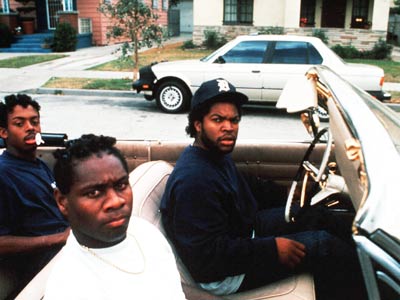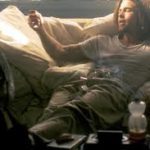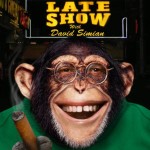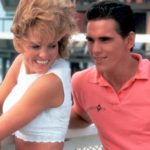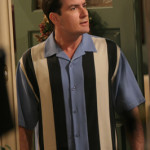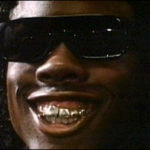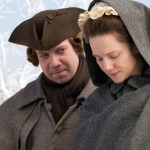“Boo-Ya”
When Matty Rich’s Straight Out of Brooklyn was released the same day as Jungle Fever, the petulant little leader of the Black New Wave struck out at his inexperience, unwillingness to go to film school, and manipulability in dealing with his studio. When Lee saw John Singleton’s Boyz ‘N’ the Hood, he nodded, congratulated the director on a job well done, and moved on to making Malcolm X. Supposedly, Singleton promised Fishburne that he would write him a great role when he saw the great actor slumming as Cowboy Curtis on Pee Wee’s Playhouse. Whether that’s true or not, Fishburne’s strong and disciplining Furious Styles is probably the screen’s best father figure since Gregory Peck’s Atticus Finch in To Kill a Mockingbird. After all I suppose you’ve got to be pretty bad to get away with a name like Furious. It was a weird year for Black cinematic names as Jungle Fever weighed in with the improbable pair of brothers Flipper and Gator Purify. Nevertheless, Fishburne’s Furious knows the ways of South Central Los Angeles and is determined to be the difference between his son Tre (Cuba Gooding Jr) and the innumerable young men like him that are shuttled off to the penitentiary if they’re lucky, and the cemetery if they’re not.
The amazing thing about Boyz ‘N’ the Hood is how quietly effective it is. Even the film’s top hell raiser Ice Cube’s Doughboy is underplayed with self realization about the impossibility of his surviving day to day in an world characterized by violent standoffs, city wide indifference, lack of opportunity, and his own sad self destructive impulses and loyalties. When Doughboy avenges his brothers death, audiences widely and stupidly applauded what was meant to be his tragic failure to escape the areas endless recycling pattern of killing and violence. Seconds later he just slips off into oblivion another statistic.
The movies tragic pattern is established early on. When Tre’s mother sends her misbehaving son off to live in South Central with Fishburne, Tre becomes friends with half brothers Doughboy and Ricky. Ricky is their mother’s favorite because she preferred his absent father to Doughboy’s. When the impulsive and less street smart Ricky gets himself into a mess, Doughboy, perhaps convinced by his mother’s preference, sacrifices himself and often physically battles to get his brother out of trouble. Ice Cube’s performance as Doughboy is a marvel of understatement, pride, unexpected intelligence, and doomed strength. Sadly the film shows little for him to do other than hang out on the porch with his friends drinking malt liquor.
Fishburne as the movie’s moral center tries to impart responsibility and awareness in his son of the realities of life as a Black male in America. The only thing that manages to impair his strong proud message about Compton and gentrification is the inexplicable mid speech jolting presence of Whitman Mayo the guy that played Grady on Sanford and Son. It’s nice to see the guy work but it makes it hard to remain dead serious when Grady is hanging out with the boys in Compton. One second you’re bemoaning the fate of the African race in America and the next you’re looking out to see if you can find Bubba, Julio, Lamont or that red junk trunk. By the way how did this movie get made without a thirty second cameo by omnipresent man of the ‘90s Samuel L. Jackson? Otherwise it’s a sadly optimistic and touching classic that confidently conveys a coherent solemn mood of a modern American wasteland.

